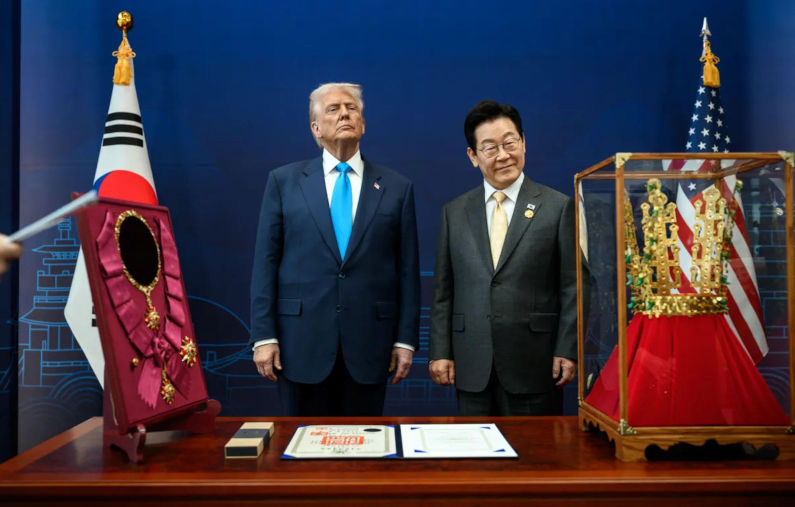Zombie multilateralism: The undead world of APEC
November 5, 2025
After 20 years, APEC returned to Korea, but it feels different.
Leaders arrived in Gyeongju for the first Korean-hosted summit since Busan 2005, but the optimism that defined APEC 20 years ago has vanished. The hallways are full, the cameras are flashing, yet something vital has gone missing.
The truth is simple: APEC has become a zombie. It moves, it speaks, it performs all the gestures of life – but its soul has gone.
What happened to APEC? It once sat at the cutting edge of multilateralism and trade liberalisation. What happened over those two decades between Busan and Gyeongju?
It’s simple. We reached the end of the American era that defined globalisation. The liberal order built on US leadership fractured into a multipolar world where power is contested, rules are conditional and Washington’s authority is no longer taken for granted.
APEC was born in a different time – one sustained by the belief that markets and multilateralism could bind the region together. That belief has evaporated. What remains is inertia: institutions that cannot adapt but refuse to disappear.
Nothing shows this decay more clearly than the debate over the “Gyeongju Declaration”. Washington, once the loudest advocate for open markets, no longer argues for free trade at all. The US president barely deigns to attend, staying in Gyeongju for the shortest time. It was not APEC, it was TRUMPEC. The US position is openly transactional: tariffs, reshoring and “friend-shoring” have replaced the liberalisation it once demanded from others.
South Korea’s diplomats look to one side, and they’re pushing for a Gyeongju Declaration that reaffirms free trade and open markets – language designed to keep APEC’s founding ideals alive. They look to the other, and they’re locked in tense negotiations with Washington over tariffs and investment, trying to protect Korean industries from the very protectionism their summit rhetoric disavows.
That leaves APEC lost in an ideological void. The institution was built to promote the very order Washington abandoned. Member economies know it, but few are ready to admit it. Some, like Japan and Korea, still frame open markets as an aspiration; others quietly align with the new protectionist consensus. The result is a declaration that will speak earnestly of “resilience” and “inclusive growth”, but say nothing meaningful about trade itself.
What was once APEC’s core mission has become a taboo subject – the clearest sign that multilateralism, at least in its liberal form, is already dead.
The Gyeongju Declaration has only two possible fates. It will either fail, which will forever mark Gyeongju as a failure; or it will be empty rhetoric, an empty, meaningless zombie declaration that serves absolutely no purpose.
A more realistic approach would have been to seek a narrow declaration: a focus on AI, digital commerce, or one of the emerging problems that demand regional rules. APEC could have proved its relevance by solving something small and real. It could have returned to its functional roots. Instead, it’s still pretending to solve everything.
APEC continues like this because the act of meeting has become the purpose. The choreography is familiar: plenary sessions, cultural performances, the group photo. None of it changes policy. Yet, no government wants to be the one to end the dance.
That’s zombie multilateralism – the repetition of institutional life after conviction has died. These meetings survive on habit and nostalgia, not on shared intent. They reassure bureaucracies that the system still functions, even when its outputs are empty.
For South Korea, this is both triumph and trap. Hosting is an impressive show of capability, but it carries no strategic reward. Korea is already respected as a world-class convener; another flawless summit doesn’t change that.
The problem is structural. Korea’s diplomacy depends on multilateral platforms where middle powers can shape agendas between the US and China. But those are the very forums now losing relevance. The middle powers that once built APEC now find themselves maintaining an institution the great powers have outgrown.
In the 1990s, APEC thrived because timing, resources and leadership aligned. None of those conditions exist anymore. The middle powers are still present — hosting, organising, smoothing over disputes — but they’re caretakers now, keeping the machinery polished as it grinds toward irrelevance.
It’s tempting to dismiss all this as failure, but zombie multilateralism persists for a reason. It provides structure in a chaotic world. It allows countries to signal continuity and reliability. It creates the illusion that something larger than raw power still governs international affairs.
But illusions cannot last forever. If institutions like APEC want to matter again, they’ll need to shrink their ambitions and focus on function over form. Co-operation will have to be modular — built around shared interests such as AI regulation, supply-chain resilience or carbon pricing — rather than grand visions of universal liberalisation.
The Gyeongju summit reflects all of this. It’s a mirror held up to the global system – polished, organised, perfectly staged and utterly detached from momentum. The leaders’ smiles, the joint communiqués, the talk of “shared prosperity” – these are the ceremonial movements of diplomacy that can no longer inspire belief.
APEC will survive, just as the WTO, the G20 and other global bodies survive. They will keep walking, meeting, declaring. But survival isn’t success. It’s simply motion without direction.
Zombie multilateralism is not about failure; it’s about inertia mistaken for endurance. The real question after Gyeongju is whether Korea and other middle powers will keep animating these diplomatic corpses – or finally look to a great power that is willing to support the building of something new?
Republished from Junotane, 30 October 2025
The views expressed in this article may or may not reflect those of Pearls and Irritations.

